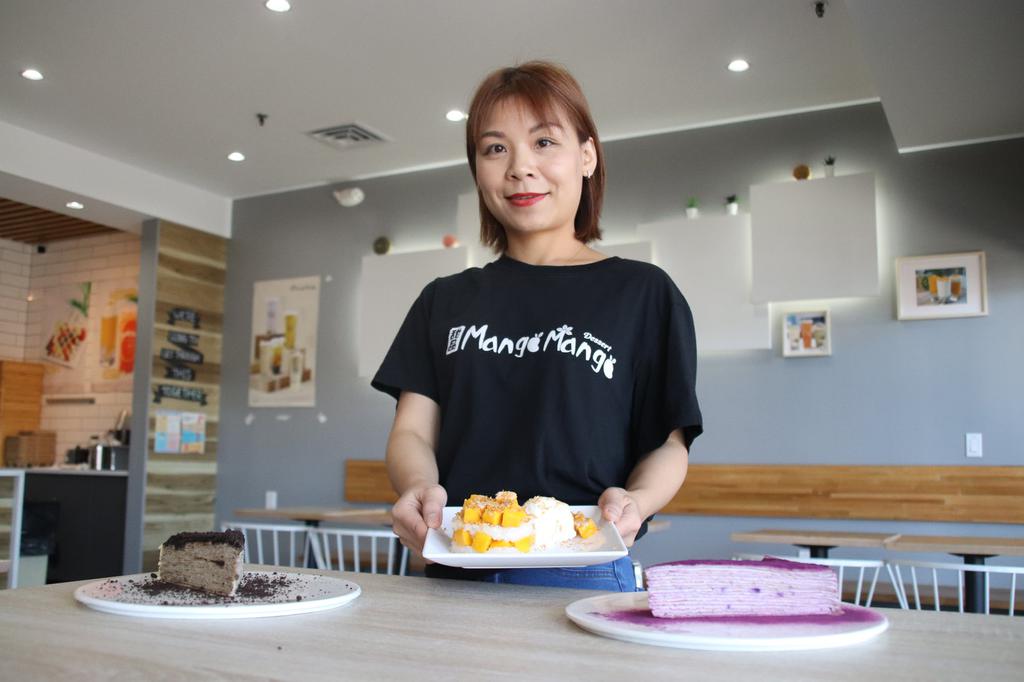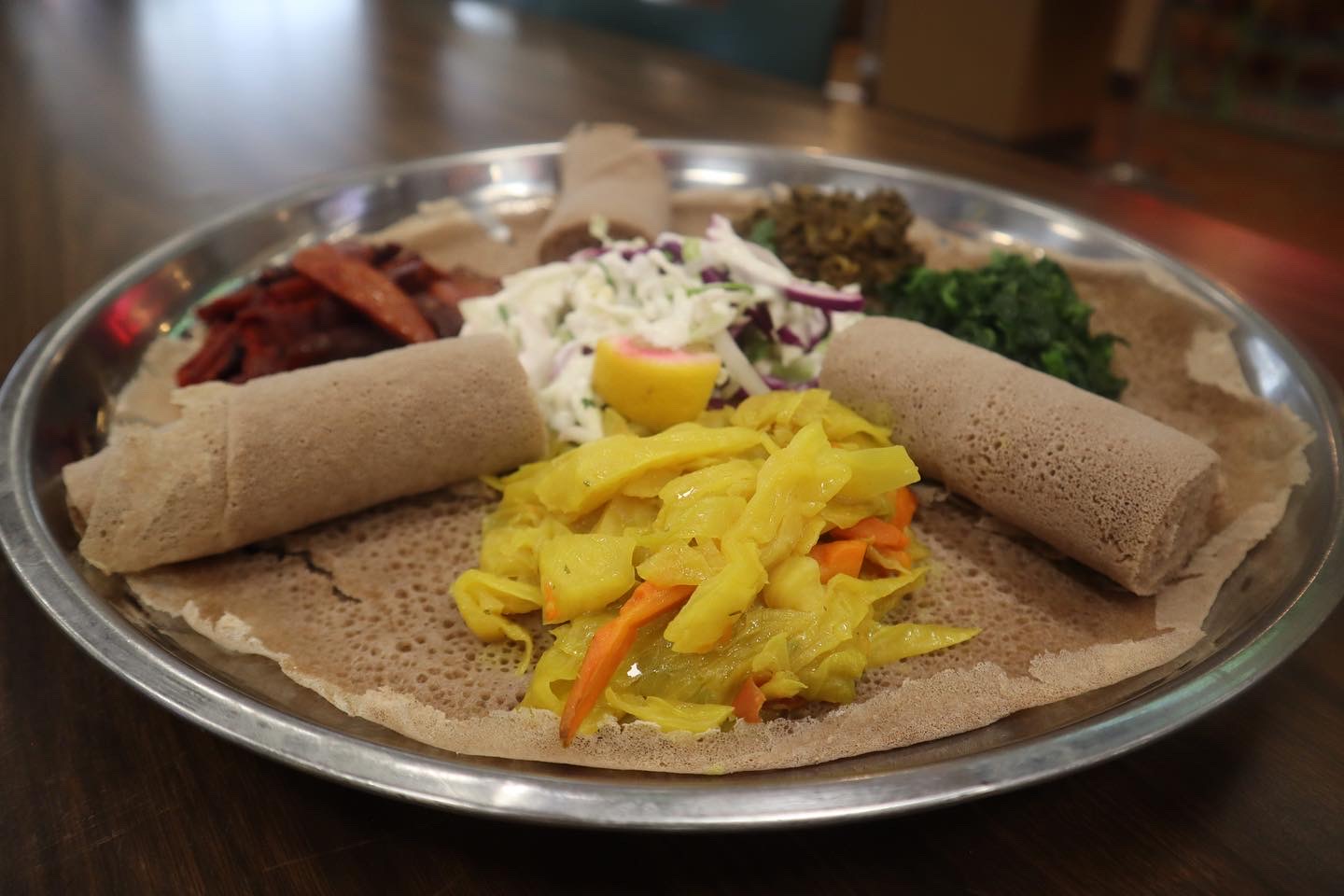The many metro manifestations of mango

For many, mangoes are defined by bright colors, aromatic flavor and embodiment of the sun-soaked tropics.
But for some Denver-area business owners, the fruit is also a sense of identity, cultural connection and one’s openness to the new. From a refugee resource center offering an array of dine-in cuisines to a dessert bar fusing traditional Hong Kong sweets with western styles, the mango serves as a token of the wider world for a land-locked metropolitan area.
At Mango House in Aurora, such sentiment could not better describe the mission of P.J. Parmar, who began the organization in 2014 to provide resources — primarily low-cost healthcare — to refugees, asylum seekers and undocumented immigrants.
It also serves as a marketplace, with a grocery store and several vendors preparing and selling fresh-made food from their home countries.
“Mangoes are from everywhere our patients come from, but they are not from the U.S.,” said Parmar, whose family immigrated from India, where mangoes are cherished and abundant.
Parmar said he chose the name Mango House because he wanted something “tasty and fun” that paid homage to his patients and patrons. He said he sees people from a broad swath of countries and regions, including Nepal, Burma, Somalia, Iraq, Eritrea, Afghanistan and Ethiopia.
Some who come to Mango House do so for space to start their business. Currently, it is home to five small food stalls: Urban Burma, known for its rice noodle bowls, curry and samosas; Jasmine Syrian Food, with cumin and lemon flavored hummus and chicken; Odaa Ethiopian Restaurant, providing an abundance of flavorful meats and vegetables; Nepali Mountain Kitchen, serving up warm curry and momo and Golden Sky Sushi which offers a fusion of Japenese and other Asian cuisines.

“All my tenants are my patients,” Parmar said. “I like to think what we do is unique.”
Siri Tan, who began serving Burmese cuisine from his stall — Urban Burma — in 2019, said without Mango House “we wouldn’t exist.”
Tan said he “wanted to introduce Burmese cuisine into the Denver area” and, through a patchwork of cooking education that included recipe books, online videos and tips from the Burmese community, he made that dream a reality.
“I love Asian food, all kinds of Asian food,” Tan said. “When I hear that people like our food, that’s what makes me happy.”
For Parmar, he hopes the food of Mango House can offer an invitation for Coloradans to explore something new and build relations with their immigrant neighbors.
“I’d like to think we aren’t just preaching to the choir, with our restaurant goers already loving refugees,” Parmar said. “I do think, occasionally, someone — adult or even a child — who has doubts towards foreigners is brought as part of a group, and their eyes are opened a bit when they are here. At least their mouths, or palates, are opened.”
Chance to try something new
For business owner Robert Kuo, who co-owns Mango Mango Desserts in Denver, bringing customers the tastes of Asia drove him to open his shop.
“I think people like to come to try new things,” said Kuo, who opened the store in 2019 alongside his business partner, Emma Mo.
Founded in Flushing, New York, Mango Mango has since been franchised to several locations across the U.S.
Kuo, who immigrated from Taiwan at age 5, said he fell in love with the business after first trying it in Flushing and sought to open one in Denver because, at the time, he saw no “truly Asian dessert places.”
The dessert bar, offering roughly 30 meals and 20 drinks, imbues the sweet and citrus-like flavors of mango into nearly all its cuisine. The signature dessert is modeled after a traditional Hong Kong favorite and consists of mango ice cream, fresh fruit, juice and soba — edible starch pearls that Kuo said have been eaten “way, way, way before boba.”

Mangoes, Kuo said, are “in every corner of Hong Kong,” and that dessert, in particular, is a beloved treat.
“A lot of people like mango and I think it’s a perfect fit (for our shop),” Kuo said.
Mango Mango offers a pallet of other sweet treats, some of which are inspired by more western foods such as a layered crepe cake with mango cream filling or fresh-baked waffles drizzled with chocolate and cold mango chunks.
And it’s not just mango that’s on the menu. The shop also serves flavors for other desserts that include matcha, durian and taro.
Some of these come in the form of warm dishes, popular during the winter, Kao said. Others, such as bright green durian pancake rolls and purple-powdered taro cakes, present a unique and inviting option for customers — though these desserts are more subtle and savory compared with the reliable sweetness of the mango counterparts.
Symbol for a mission
For Marc Corona, who runs Mango Treet Coffee in Englewood, mangoes serve as a form of expression for the business’ larger mission.
A branch of MANNA Worldwide — a global nonprofit network that works with organizations in 50 countries — all proceeds from Mango Tree go back into MANNA’s efforts to fight global poverty, which include building schools and food centers and expanding access to water, education and job opportunities.
Corona said the coffee shop’s name harkens to a MANNA trip in 2002 when community members gathered under a mango tree in Kenya to discuss anti-poverty programs for the area.
“As we’ve built Mango Tree, that’s the mindset that we have, creating a space where everybody feels welcome and can be a part of something bigger than themselves,” Corona said.
Opened in June 2021, Mango Tree roasts its coffee in-house and offers a reliable cafe menu complete with espresso-based drinks, chai and teas.
But one stand-out item is the mango shot, a blend of mango chunks, kefir — a fermented dairy product — and spices.

“I think one of the main aspects that drives what we do is this sort of passion and drive to have fun,” Corona said. “Having a mango shot was just another way to create that experience for people.”
People are at the heart of Mango Tree’s ethos, Corona said, and outside of providing assistance to global poverty-fighting efforts, the business also strives to be an advocate locally.
Mango Tree partners with area churches and other organizations to provide packed lunches to Englewood Schools District students, a compliment to the district’s free and reduced lunch program.
“We want to be an asset to the community,” Corona said, adding the coffee shop also serves as a gathering space, much as its namesake mango tree did 20 years ago. “It’s cool to see the community have the same mindset as we do of ‘hey, we like to do things together.'”
Published on ColoradoCommunityMedia.com.
